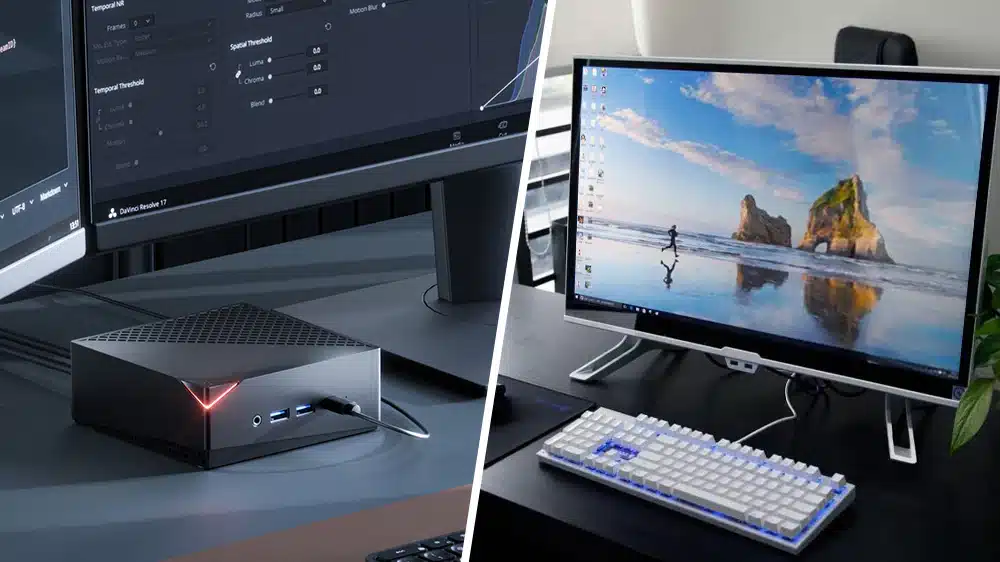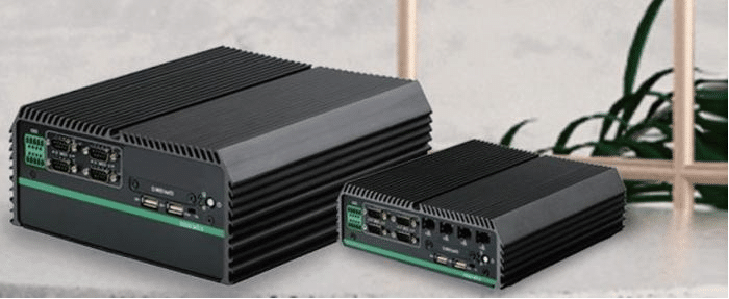
Industrial Mini PC vs Desktop PC: What’s the Difference?
Overview
With the rapid development of modern technology, businesses need to choose the right computing devices to meet their business needs. While desktop PCs remain popular in office and personal use, industrial mini-PC are increasingly being used in manufacturing, automation, kiosks and digital signage applications. This article explores the differences between the two types in terms of design, performance, durability, and usage to help you make informed decisions.

What is Mini PC?
It’s important to first define a mini PC. A mini PC is basically an exceptionally small and thin desktop pc. It works almost just like a standard desktop, however the primary distinction is that these mini desktop pc is much more compact. A tiny desktop computer can be used for a wide range of tasks, from emailing and browsing the internet to gaming and video editing, both at home and at work.
Even while mini PCs often produce less speed, you won’t notice much of a difference when compared to a standard desktop. However, there is room for improvement in terms of SSD and working memory. In terms of appearance, the mini desktop PC is also significantly more sophisticated, smaller, and more appealing than a standard desktop.
What is a traditional desktop PC?
Traditional desktop PCs are full-fledged devices assembled from standard components housed in a separate case. These systems typically consist of a motherboard, power supply, central processing unit, memory, storage devices, graphics card, and one or more cooling systems.
The main advantage of desktop computers is their high degree of customizability and maintainability.
Desktop computers offer:
- Wide hardware compatibility, allowing users to freely combine components
- Support for separate graphics cards and multiple storage devices
- Convenient upgrade options, facilitating gradual hardware improvements
- Excellent temperature control, suitable for continuous high workloads
However, this comes at a price: - Large size and relatively high power consumption
- Requires precise installation and cable management
- Limited adaptability for cramped workspaces or mobility scenarios
- May be over-specified for users who only need basic office performance
Advantages of Industrial Mini PC
Now that you understand what mini PC is, it’s time to highlight the most significant benefits of these machines.
Mini PCs bring together a range of advantages that make them an appealing alternative to traditional desktops. Thanks to their compact design, they save space and can easily fit behind a monitor, TV, or on a small desk, often going almost unnoticed. At the same time, they are extremely versatile, supporting essential features like Wi-Fi, Bluetooth, and webcams, and are suitable for tasks such as emails, professional work, gaming, media editing, or even advertising.
With various models available, users can choose one tailored to their needs. Another strength lies in their cost-effectiveness: mini PCs are generally more affordable than full-sized desktops or laptops while still offering solid performance. They are also highly energy-efficient, consuming far less power—often no more than 65 watts—even at full capacity, thanks to designs optimized for portability and long-lasting use. In addition, their lightweight form factor makes them easy to carry to meetings or on the go, ensuring convenience at all times. Finally, many mini PCs use passive cooling systems instead of fans, which significantly reduces noise and creates a quieter, more comfortable working environment.
Industrial Mini PC vs Desktop PC
1. Form Factor and Space Efficiency
Industrial Mini PCs are very compact, often smaller than books, and designed for space-limited environments.
Desktop PCs are larger, require more desk or floor space, and may not be suitable for industrial environments.
2. Durability and Reliability
Industrial Mini PCs feature a fanless design, rugged chassis, and great thermal insulation to withstand dust, vibration, and harsh environmental conditions.
Generally, laptops are not designed for this type of environment and can fail under mechanical stress.
3. Performance and Customization
Industrial mini PCs run on ARM and x86 processors, enabling flexibility in low- or high-power systems.
Desktop PCs typically focus on higher performance, with options for more powerful CPUs and GPUs, but lack technical reliability.
4. Power Management and Efficiency
Industrial mini PCs have low power consumption, making them ideal for 24/7 operation and remote installation.
Desktop PCs consume a lot of energy due to their advanced features and energy efficient design.
5. Industrial mini pc vs. Desktop pc : Applications and Use Cases
Industrial Mini PCs: kiosks, digital signage players, machine vision systems, automation controllers, medical devices.
Desktop PCs: office workstations, gaming, graphic design, and general computing tasks.
Conclusion
The choice between an industrial mini PC and a desktop PC depends on your environment, business needs, and application needs. If you’re looking for durability, small size, and power efficiency, an industrial mini PC is the best bet. For more advanced tasks, working well in a controlled environment, a desktop PC is still a good choice.

FAQ
1. What is the lifespan of an industrial mini PC compared to a desktop PC?
Industrial mini PCs often last 5–7 years or more in harsh environments, while desktop PCs may last 3–5 years under standard use.
2. Can an industrial mini PC replace a desktop PC for office work?
Yes, many industrial mini PCs have the processing power to handle office tasks, but they are optimized for industrial applications.
3. Are industrial mini PCs more expensive than desktop PCs?
Yes, due to ruggedization and specialized components, but the cost is offset by longer lifespan and lower maintenance needs.
4. Do industrial mini PCs support multiple displays?
Yes, most modern industrial mini PCs support dual or triple display setups.
5. Which processor is better for industrial mini PCs, ARM or x86?
It depends on your application—ARM offers lower power usage, while x86 provides higher performance for demanding tasks.











